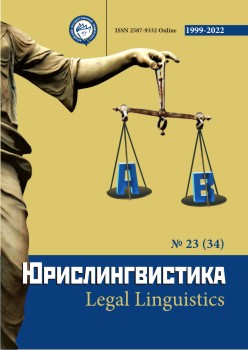On the Formationof Common Legal Consciousness and Waysofits Strengtheningin the Modern Society of Russia and Bulgaria
Abstract
Comprehension of the institution of ordinary legal consciousness as an element of the spiritual and intellectual life of society in a specific period allows one to interpret the entire spectrum of state and legal phenomena, which are to be taken into account when social and legal policy of the state is developed, which determines the relevance of such studies. The relevance of this study is confirmed by the state of the social and economic sphere in Russia and Bulgaria, characterized by a series of reforms in: the economy, the structure of society, state institutions and legislation during the transition to post-capitalism. The research tasks of the authors were - the establishment of the common and special between the institutions of the two countries in the sphere of ordinary legal consciousness and, on this basis, the determination of measures to strengthen them. The research tasks were solved by analyzing the state of legal consciousness of Russian and Bulgarian citizens based on the results of empirical research.
The study led to some conclusions:
– studying the institute requires a complex approach,
– common between the institutions of the countries is due to a number of factors: belongigng to Slavic culture, language; Eurasian position; long stay in one economic and ideological paradigm; the sameness in the course of many socio-economic processes during the transition period; the retentionin the minds of citizens of the functions of socialist statehood, etc.,
– differences are manifested in the interests pursued by states due to belonging to different polarities of modern geopolitical poles,
– the coincidence of some of the proposed measures to strengthen the institution was noted: the revival of the spiritual and educational function in the field of education and family; impact on the Internet content; strengthening of civil control over the judicial system and legislative activities of the state, etc.
Downloads
Metrics
References
Астафьев П.Е. Национальность и общечеловеческие задачи (к русской народной психологии) / Вопросы философии. - 1996. - №12. - С. 84-102.
Бойчев Г.Правототрябва да отговаря на нашетоправосъзнание. Ако не отговаря, то е нелегитимно. URL: https://defakto.bg/
Буранова В.О.,Сафронова В.В. Правосознание гражданина как один из видов правосознания /Научный альманах. - 2016. - №5-1(19). - С.356-358.
Колев Т. Теория права. София, 2015.
Маджарова В.Специализираната прокуратура е атакувана, защотоработи. URL: https://dariknews.bg/novini/bylgariia/valentina-madzharova-specializiranata-prokuratura-e-atakuvana-zashtoto-raboti-2277715.
Матузов Н.И., Малько А.В. Правосознание и правовая культура / М., 2004.
Махрова М.В., Махрова Е.И. Профессиональное, обыденное и теоретическое правосознание: общее и особенное / Исследование инновационного потенциала общества и формирование направлений его стратегического развития. Курск, 2018. С. 255-258.
Наумова С.Т. Функциональные особенности антидискриминационного правосознания / Научн. труды Русенского Университета. - 2011. - С.254
Петровская А.В. Сущность и содержание идеи правового закона :автореф... канд. юрид. наук. М., 2007.
Проект Национального центра парламентских исследований «Правосознание граждан Болгарии 1999-2018 гг.». URL: https://parliament.bg/pub/ncpi/Legal%20consciousness%202018_11.10_final.pdf
Ратинов А.Р. Актуальные задачи психологии права / Психологический журнал.– 1987. - № 1. - С. 112.
Послание Президента РФ Федеральному Собранию от 01.03.2018 / Российская газета. – 2018. – №46.
Соколов Н.Я. Профессиональное осознание юристов. М., 1988.
Челышев П.В. Диалектика обыденного и специализированного сознания / Манускрипт. - 2017. - № 5(79).- C. 198-201.
Чефранов В.А. Правовое сознание как разновидность социального отражения. Философско-методологический очерк. Киев, 1976.
Copyright (c) 2022 Людмила Мукова, Владимир Беденков

This work is licensed under a Creative Commons Attribution 4.0 International License.
The authors, which are published in this journal, agree to the following conditions:
1. Authors retain the copyright to the work and transfer to the journal the right of the first publication along with the work, at the same time licensing it under the terms of the Creative Commons Attribution License, which allows others to distribute this work with the obligatory indication of the authorship of this work and a link to the original publication in this journal .
2. The authors retain the right to enter into separate, additional contractual agreements for the non-exclusive distribution of the version of the work published by this journal (for example, to place it in the university depository or to publish it in a book), with reference to the original publication in this journal.
3. Authors are allowed to post their work on the Internet (for example, in a university repository or on their personal website) before and during the review process of this journal, as this may lead to a productive discussion, as well as more links to this published work (See The Effect of Open Access).











